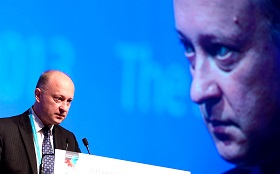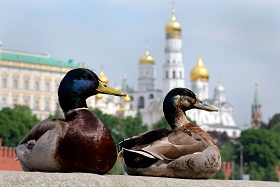Russians don’t back down. This principle has remained at the core of Russia’s foreign policy throughout the years, no matter who was in charge, and has barely ever wavered. Even during times when the country was pushed into a corner following defeat in a war or the complete collapse of its statehood, the Russian people always held onto the hope that revenge would be taken sooner or later, that the historical wrongs inflicted upon their nation would be righted. “No worries,” they would say, grinding their teeth and wiping their bloody noses, “we’ll get the last laugh!”
Russians don’t back down! And if that is really the case, we will be waiting a long time for Moscow to give in to external pressure and make concessions. This is something that the West has come to learn in recent years following its repeated attempts to get the Kremlin to change its course through various economic and political sanctions. That is not to say that the sanctions have not inflicted considerable damage on the Russian economy, because they most certainly have. However, they have also driven the elites to rally around the Kremlin and led to the rise of anti-Western sentiments in Russian society.
We are not suggesting that Europe and the United States should pursue a policy of "conciliation" with Moscow, meekly accepting everything the Kremlin does as a natural phenomenon that is beyond any human influence. All we are saying is that pressure cannot and should not be a stand-in for diplomacy on every single issue. Steadfastly refusing to enter dialogue, slamming the door shut on any hope of communication, and treating Russia as a rogue state—all this creates additional problems for both the East and West.
The West could always take a wait-and-see approach in the hope that the ship of Russian foreign policy will eventually crash into a reef, as those at the helm will not want to change course in the midst of such a severe geopolitical storm. But if this happens, then the consequences of this epic shipwreck will no doubt be felt throughout the entire world. The West cannot be interested in such an outcome.
Just like in many other countries, leap years are generally seen as bad luck in Russia, full of unpleasant surprises, unforeseen problems and bitter trials. And this year has been no different. In February, Russia nearly got caught up in a direct military confrontation with Turkey in Syria. In March, world oil prices plummeted, ushering in a global economic recession. And by April, Russia was entirely at the mercy of the coronavirus pandemic. The summer was marked by mass protests in Khabarovsk and came to an ignominious end with the unfortunate Alexei Navalny case and unrest in neighbouring Belarus. The New Year holidays are still a while off, but we can already say that 2020 has been the most difficult for the Russian leadership this century.
What does the captain of a ship do when caught in the middle of a perfect storm? Drop sails, slow down, correct the course and, if necessary, dump the ballast or drop anchor? Logic dictates that the crisis should have brought about significant changes in Russia’s foreign policy. To reduce the number of “soft assets” or renege on some of its burdensome international obligations, for example. Or to abandon its warlike rhetoric and search for at least tactical compromises with its geopolitical opponents. Or even some kind of unilateral symbolic action to demonstrate its goodwill and change its rather unenviable image within the international community.
But none of these things have happened. Russian foreign policy, as far as we can tell, does not, and will not, change. On anything — be it Syria, Libya, Ukraine or Venezuela. Russia has not made any new large-scale proposals, let alone unilateral gestures of goodwill. As the Navalny case has shown, the rhetoric towards the West has only worsened. To continue our metaphor, the ship of Russian foreign policy is careering through the storm, gathering speed and staying the course, with the ballast and anchor still firmly on board.
So, what is all about? It is not like the Russian expert community is short on new ideas and initiatives. Similarly, there is little reason to assume that the Russian leadership does not appreciate the seriousness of the current situation. All that notwithstanding, it is clear that if any major shifts do take place in relations between Russia and the West this year, they will most certainly be for the worse.
One possible explanation for this state of affairs is the accumulated inertia in the confrontation between the two sides. The years that have passed since the Ukrainian crisis have taken their toll on the Russian leadership, and indeed on society in general. Deploying a huge and unwieldy state machine, refocusing a heavyweight state propaganda system, and changing the attitudes that govern the day-to-day activities of the army of “deep state” officials — this is tantamount to changing the trajectory of a supertanker with a displacement tonnage of hundreds of thousands of tonnes. All the more so because Russian foreign policy today is shaped more by the siloviki than it is by the diplomats and technocrats in government. It is even more difficult to change the public’s opinions that have taken shape in recent years about the modern world and Russia’s place within it. Just because the Russian people are tired of the confrontation with the West, this does not mean that they will enthusiastically support a change of course in the spirit of Mikhail Gorbachev or Boris Yeltsin.
Another possible explanation is that unprecedented shocks and cataclysms always give rise to hope that a miracle might happen. But what if these shocks and cataclysms affect the other side more than they affect you? Many in Moscow view the crisis of the world system, which has only accelerated in 2020, as a final judgement on the West. Some even see it as an inglorious end to the market economy and to political liberalism in general. The recent claim of Presidential Adviser Maxim Oreshkin that Russia will become one of the world’s top five economies this year is quite striking here. Not because the country’s economy is experiencing rapid growth, but because the German economy will suffer more than Russia’s. If you are certain that time is on your side, that you will emerge from the crisis in better shape than your opponents, then you are less inclined to negotiate here and now.
However, there is a third possible explanation for the immutability of Russia’s foreign policy, one that, in my opinion, gets to the core of the matter far better than the previous explanations. Russia’s leaders have long been convinced that any unilateral steps or shifts in Moscow’s foreign policy will be perceived in the West as a sign of weakness, and thus an invitation to crank up the pressure on Russia. It is this logic that prevents the Kremlin from admitting even the most obvious mistakes and miscalculations of its past foreign policies. This, in turn, significantly hampers any attempt to change the foreign policy of the present or outline alternative policy options for the future.
Russians don’t back down. This principle has remained at the core of Russia’s foreign policy throughout the years, no matter who was in charge, and has barely ever wavered. Even during times when the country was pushed into a corner following defeat in a war or the complete collapse of its statehood, the Russian people always held onto the hope that revenge would be taken sooner or later, that the historical wrongs inflicted upon their nation would be righted. “No worries,” they would say, grinding their teeth and wiping their bloody noses, “we’ll get the last laugh!”
Russians don’t back down! And if that is really the case, we will be waiting a long time for Moscow to give in to external pressure and make concessions. This is something that the West has come to learn in recent years following its repeated attempts to get the Kremlin to change its course through various economic and political sanctions. That is not to say that the sanctions have not inflicted considerable damage on the Russian economy, because they most certainly have. However, they have also driven the elites to rally around the Kremlin and led to the rise of anti-Western sentiments in Russian society.
Russians don’t back down! Whatever those who are in favour of tightening the screw on Russia might have you believe, the transformation of the Soviet system did not begin because it was forced into a crippling arms race with the United States. It began when the USSR no longer had a geopolitical enemy to bring its people together and legitimize Soviet leadership.
We are not suggesting that Europe and the United States should pursue a policy of “conciliation” with Moscow, meekly accepting everything the Kremlin does as a natural phenomenon that is beyond any human influence. All we are saying is that pressure cannot and should not be a stand-in for diplomacy on every single issue. Steadfastly refusing to enter dialogue, slamming the door shut on any hope of communication, and treating Russia as a rogue state—all this creates additional problems for both the East and West.
The West could always take a wait-and-see approach in the hope that the ship of Russian foreign policy will eventually crash into a reef, as those at the helm will not want to change course in the midst of such a severe geopolitical storm. But if this happens, then the consequences of this epic shipwreck will no doubt be felt throughout the entire world. The West cannot be interested in such an outcome.
First published in El Pais.







